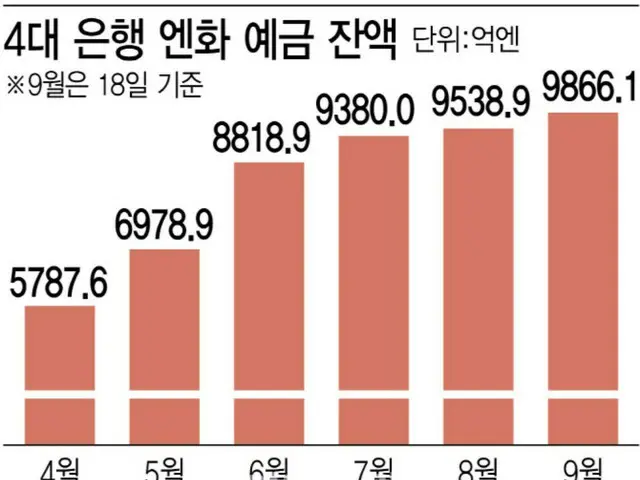There is. According to the financial industry, the total yen deposit balance of KB Kunmin (Kookmin), Shinhan (Shinhan), Hana, and Woori has increased from 578.8 billion yen at the end of April to 98.8 billion yen as of the 18th of this month.
It increased by 70% to 6.6 billion yen. Since the beginning of this month, it has increased by 32,726 million yen. This means that in about half a month, the amount increased by twice the amount for one month in August (15,893 million yen).
The total yen deposit balance of the four major banks was 578.764 billion yen in April, 697.86 billion yen in May, 881.886 billion yen in June, and 937.995 billion yen in July.
The yen has steadily increased to 953,888 million yen in August, and as of September 18th, it has reached 986,614 million yen, approaching 1 trillion yen.
The reason there is currently a yen buying boom is because investors feel that the yen is cheap. actually,
The average exchange rate of the yen over the past 10 years was 1,038.2 won. Generally speaking, the yen/won exchange rate was ``100 yen = 1,000 won.'' However, the yen/won exchange rate is 2
This is the lowest level in eight years since June 2015. The yen/won exchange rate, which hit a new low the previous day, was 894 won, a 14% drop from the average. The yen exchange rate has returned to its average level.
This means that you can earn more than 10% foreign exchange profit. A bank official said, ``Along with travel demand, the number of people making yen deposits for the purpose of profit continues to increase due to the weakening yen.''
"From the perspective of Japanese export companies, since the yen is cheap, there seems to be demand for them to buy yen in advance and use it for future payments."
In fact, there are messages in the financial and travel communities on the Internet saying, ``It's time to exchange money,'' and ``The yen has changed to 80.
We have received many comments such as ``We have entered the 0 won range.'' Mr. Kim (41), an office worker, said, ``I bought yen because I was planning a trip to Japan, but the current market price is quite low, so I didn't want to invest.
I bought a few more for that reason.'' However, those who invested when the yen fell to the 900 won level because they thought it was cheap are now incurring losses.
The reason the yen continues to be weak is because Japan maintains an accommodative currency policy. The dollar/yen exchange rate is currently approaching 150 yen, but
The bank has not yet intervened. In an interview with the Yomiuri Shimbun on the 9th, Bank of Japan Governor Ueda said that the negative interest rate policy could be lifted, and it looked like the yen's depreciation trend would be reversed.
It didn't change. The financial and investment industry predicts that the yen will reverse, but analyzes that the yen will continue to depreciate in the short term. Unless it is a long-term investment, it is dangerous to invest based only on the current yen exchange rate.
That's what I'm saying. Lee Yoo-jeong, a research member at Hana Bank, said, ``Looking at Japan's recent economic situation, it will be difficult to change the basic trend such as accommodative monetary policy, and the depreciation of the yen will continue for some time.''
In fact, it was revealed that Japan's trade balance in August recorded a deficit of 930.4 billion yen. The investment bank Goldman Sachs recently issued an investment memo saying, ``The yen will undergo a major reversal in the coming months.''
I don't think that will happen.''
2023/09/21 07:01 KST
Copyrights(C) Edaily wowkorea.jp 107

